Putin Wants to Reopen U.N.-Brokered Ukraine Grain Export Deal, Wheat Futures Surge

China’s exports in August show sharp slowdown from July, weakest expansion since April
|
In Today’s Digital Newspaper |
USDA daily export sale: 257,400 metric tons of corn to Mexico. Of the total, 226,920 metric tons is for delivery during the 2022-2023 marketing year and 30,480 metric tons for the 2023-2024 marketing year.
Russian President Vladimir Putin said he wanted to discuss reopening a U.N.-brokered deal that allows Ukraine to export its grain via the Black Sea after accusing Kyiv and the West of using it to deceive developing countries and Russia. Market impact: Wheat futures surged overnight. Reuters further reports that Putin today warned of a looming global food crisis and said he would discuss amending a landmark grain deal with Ukraine to limit the countries that can receive cargo shipments. Putin said only two of 87 ships, carrying 60,000 tonnes of products, went to poor countries, as he accused the West of “acting as colonial states.” More in Russia/Ukraine section.
IAEA report calls for ‘urgent’ action at Ukrainian nuclear plant. The U.N. nuclear watchdog warns of possible ‘accident’ at Russian-controlled Zaporizhzhia site. The agency has called for a "safety zone" to prevent a nuclear accident amid sustained shelling.
Ukraine’s military offensive in the east near its second-largest city of Kharkiv is gaining ground, testing Russia’s occupation forces that are also under pressure in the south.
China’s exports rose 7.1% in August, a sharp slowdown from July and the weakest expansion since April. We have updates on soybean and meat trade in China section.
No ‘advanced tech’ factories in China for U.S. firms getting CHIPS Act money.
U.S. wants a $44 per barrel cap on Russian oil prices under the agreement reached by G7 countries last week. Today’s dispatch includes why Russia and others say the cap plan won’t work, while some Yale professors think it will.
California narrowly avoids rolling blackouts amid a heat dome. Electricity continued flowing despite record energy use as Californians grappled with a sixth day of ferocious temperatures. The run of record-breaking temperatures is projected to continue this week with highs reaching into the 110s Fahrenheit in interior parts of the state. Since the end of August, Californians have received so-called flex alerts to curb energy usage by setting thermostat temperatures in the 70s and avoiding the use of major appliances, like dryers, at night.
U.S. is losing soybean-export edge as Brazil closes logistics gap. Details in Market section.
Australia’s projected bumper wheat crop may be running into supply-chain constraints, the Wall Street Journal reports. See details below.
Canadian stocks for nearly every field crop were down at the end of July 2022 compared to the same period in 2021, according to a farm survey by Statistics Canada released this morning. StatsCan said lower total supplies reflected lower production in 2021, when Canada's prairies were hit by one of the driest years on record. The survey of approximately 25,000 Canadian farms was conducted from May 13, 2022 until June 10, 2022.
Bank of England predicts that inflation will hit 13% this quarter. GDP will also turn negative this quarter. What a welcome for U.K.’s new prime minister Liz Truss. But a bit of good news: Eurozone Q2 GDP was a bit better than initially estimated.\
The S&P Global Water Index, which tracks 50 companies from around the world that are involved in water utilities, infrastructure, equipment and materials, has outperformed the S&P Global Broad Market Index by more than 3 percentage points per year since its beginning in late 2001.
On the farm policy front, payments under the Emergency Relief Program (ERP) moved up to $6.56 billion as of Sept. 5, with $5.68 billion in payments to non-specialty crop producers and $904 million to specialty crop farmers that suffered losses in 2020 or 2021.
Meatpacking supply chains are improving but profits are shrinking as pork processors are paying more for hogs from farmers and are exporting less meat to China. Details below.
HPAI confirmed in Ohio commercial layer flock in Defiance County, Ohio, flock. It is the 200th confirmed flock since February, bringing the total commercial flock birds targeted for depopulation to 40.0 million — 33.8 million were commercial egg layer birds.
Dutch ag minister resigns amid widespread pollution protests. Dutch agriculture minister Henk Staghouwer abruptly resigned after nine months, saying he was not the right person to lead an ambitious overhaul of the Dutch farming sector as it moves to comply with the EU’s Nitrate Directive and curb emissions from fertilizer and livestock. Details in Policy section.
Senate Finance Committee meets today to vote on the nomination of Douglas J. McKalip to be chief agricultural negotiator for the Office of the U.S. Trade Representative.
U.S. farmers again are pressing for immigration reform… details in Other Items of Note.
Covid boosters likely to become annual ritual, like flu shots. The White House said people can make appointments for shots at CVS, Walgreens, and other pharmacies and find out availability at Vaccines.gov. Details below.
Obamas returning to White House for official portrait unveilings. The event in the East Room will revive a tradition of presidents welcoming their predecessors — regardless of party — back to the White House.
Stacey Abrams is trailing in polls of the Georgia governor’s race, worrying Democrats who hoped she would lead the state’s blue shift.
Election Day 2022 is 62 days away. Election Day 2024 is 790 days away.
|
MARKET FOCUS |
Equities today: Global stock markets were mostly weaker overnight. U.S. Dow opened slightly lower and then turned higher in early trading. Investors worry that a soaring dollar and increasing fuel prices will prompt a global downturn. Investors will be looking to the central bank’s Beige Book release at 2:30 p.m. ET for more economic clues about how the fed will fight inflation. Fed Vice Chair Lael Brainard is also set to speak today. The focus then turns to Fed Chair Jerome Powell's speech tomorrow, after the central bank telegraphed that it would be extremely data dependent given a road ahead that'll "bring some pain to households and businesses." Traders now see a 70% chance of a third 75-basis-point move in September, up from 57% a week ago, according to the CME Group's FedWatch tool that measures pricing in the fed funds futures markets. In Asia, Japan -0.7%. Hong Kong -0.8%. China +0.1%. India -0.3%. In Europe, at midday, London -0.7%. Paris -0.5%. Frankfurt -0.5%.
U.S. equities yesterday: The Dow ended down 173.14 points, 0.55%, at 31,145.30. The Nasdaq declined 85.96 points, 0.74%, at 11,544.91. The S&P 500 was down 16.07 points, 0.41%, at 3,908.19. The S&P 500, along with the major indices, fell for the seventh consecutive day of losses, marking the longest losing streak since November 2016.
Agriculture markets yesterday:
- Corn: December corn futures rose 10 1/4 cents to $6.76, the contract’s highest closing price since Aug. 30.
- Soy complex: November soybeans fell 21 3/4 cents to $13.98 3/4. December soymeal fell $10.90 to $406.80. December soyoil dropped 297 points at 63.28 cents.
- Wheat: December SRW wheat rose 6 cents to $8.17, near the top of today’s range. December HRW wheat rose 4 1/4 cents to $8.82. December spring wheat fell 1/4 cent to $8.89 3/4.
- Cotton: December cotton rose 34 points to 103.55 after dropping to a three-week low earlier in the session.
- Cattle: October live cattle rose 50 cents at $145.05, the highest closing price since Aug. 19. October feeder cattle gained $1.15 at $186.10.
- Hogs: October led hog futures rose $1.075 to $91.10, after falling earlier near a two-month low.
Ag markets today: Wheat futures surged overnight amid news Russia is rethinking the Ukraine grain export deal. Corn and soybeans followed wheat to the upside. As of 7:30 a.m. CT, wheat futures were trading 23 to 34 cents higher, corn was 6 to 8 cents higher and soybeans were 4 to 5 cents higher. Front-month crude oil futures were marginally firmer, while the U.S. dollar index was nearly 400 points higher this morning.
Technical viewpoints from Jim Wyckoff:
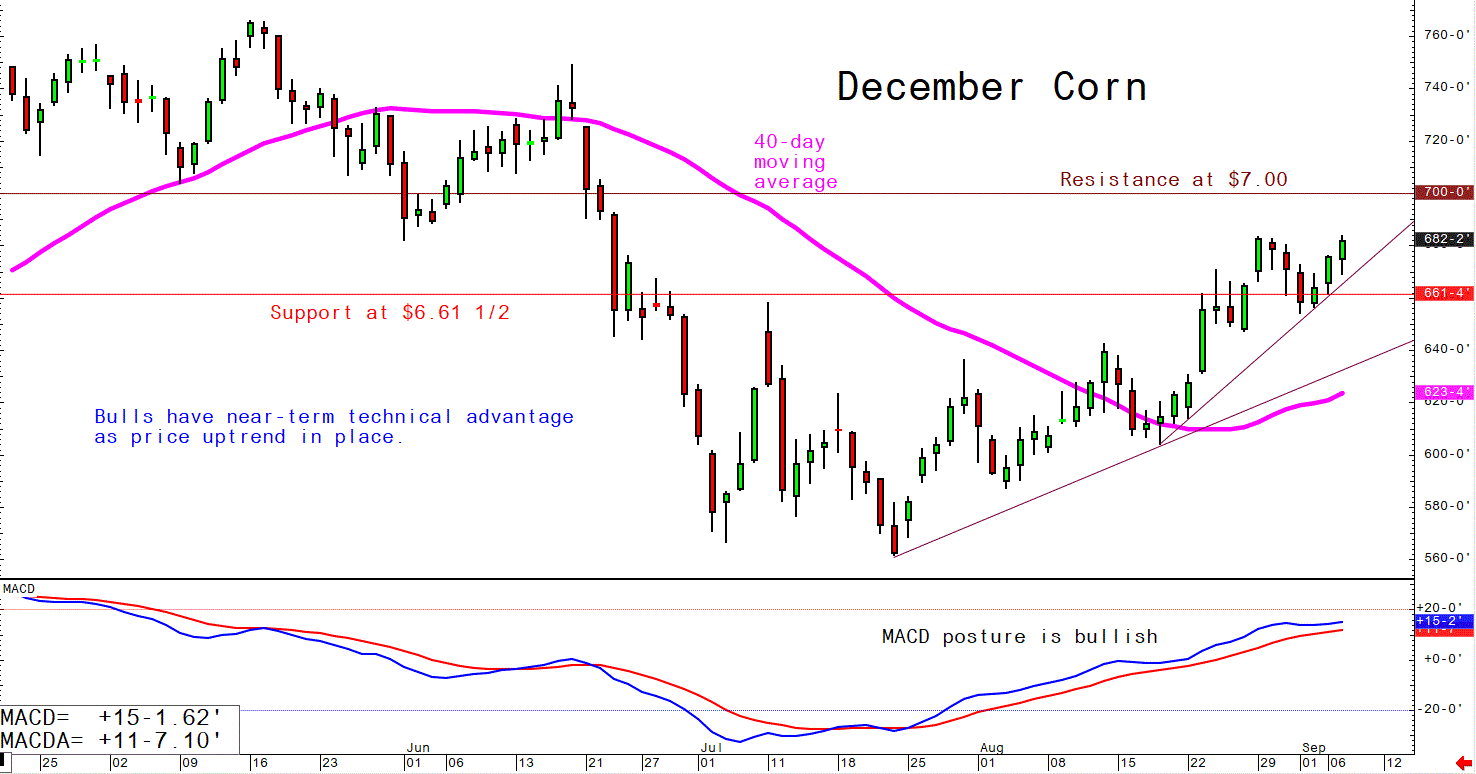
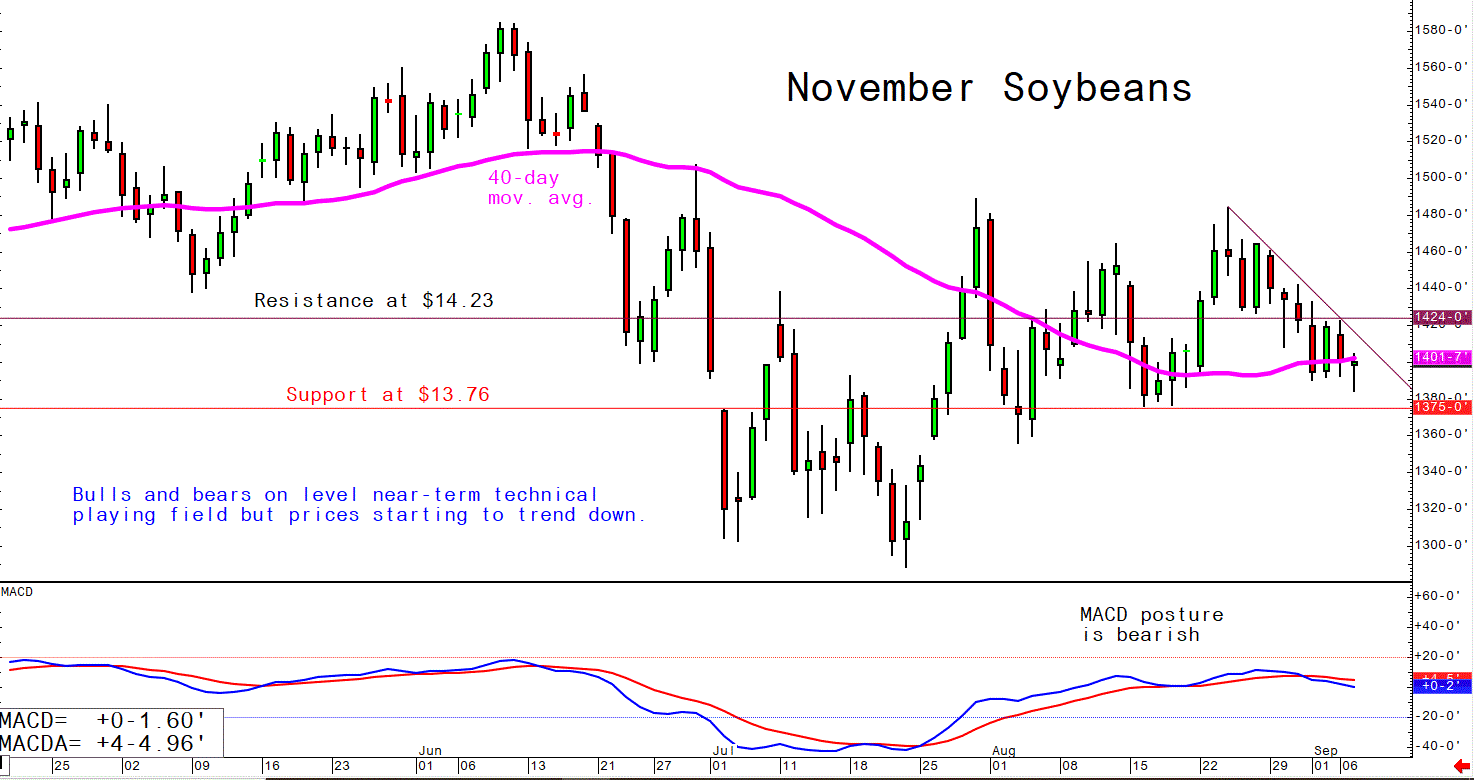
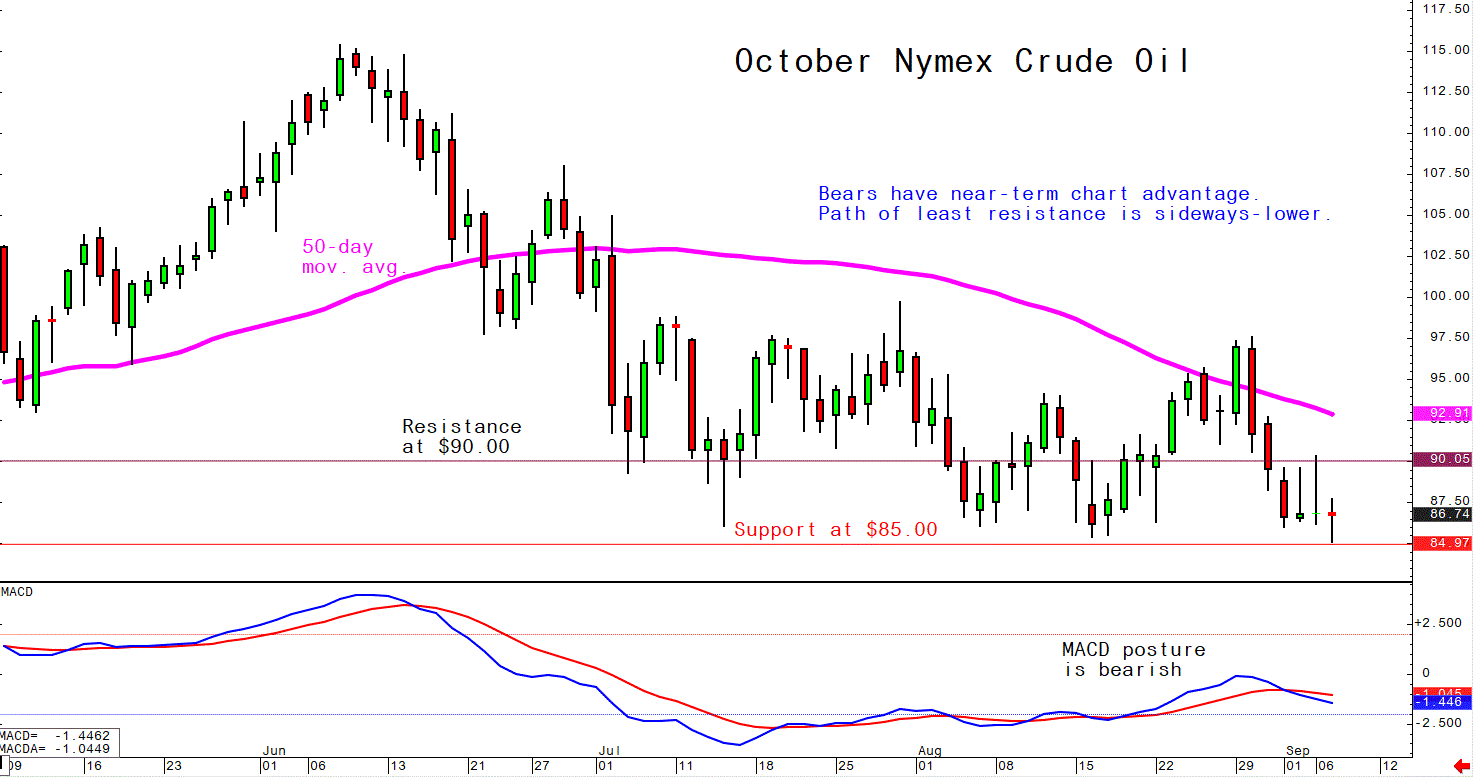
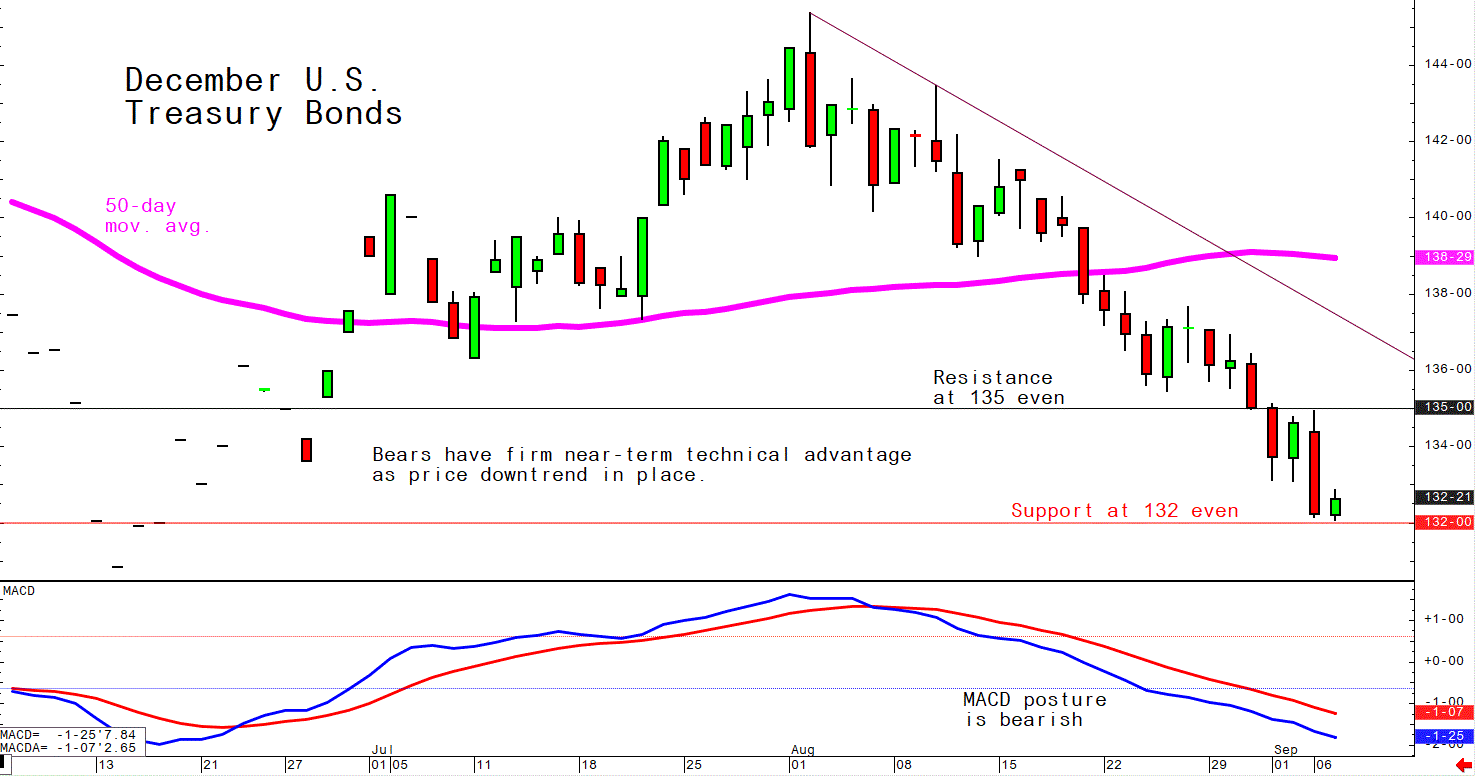
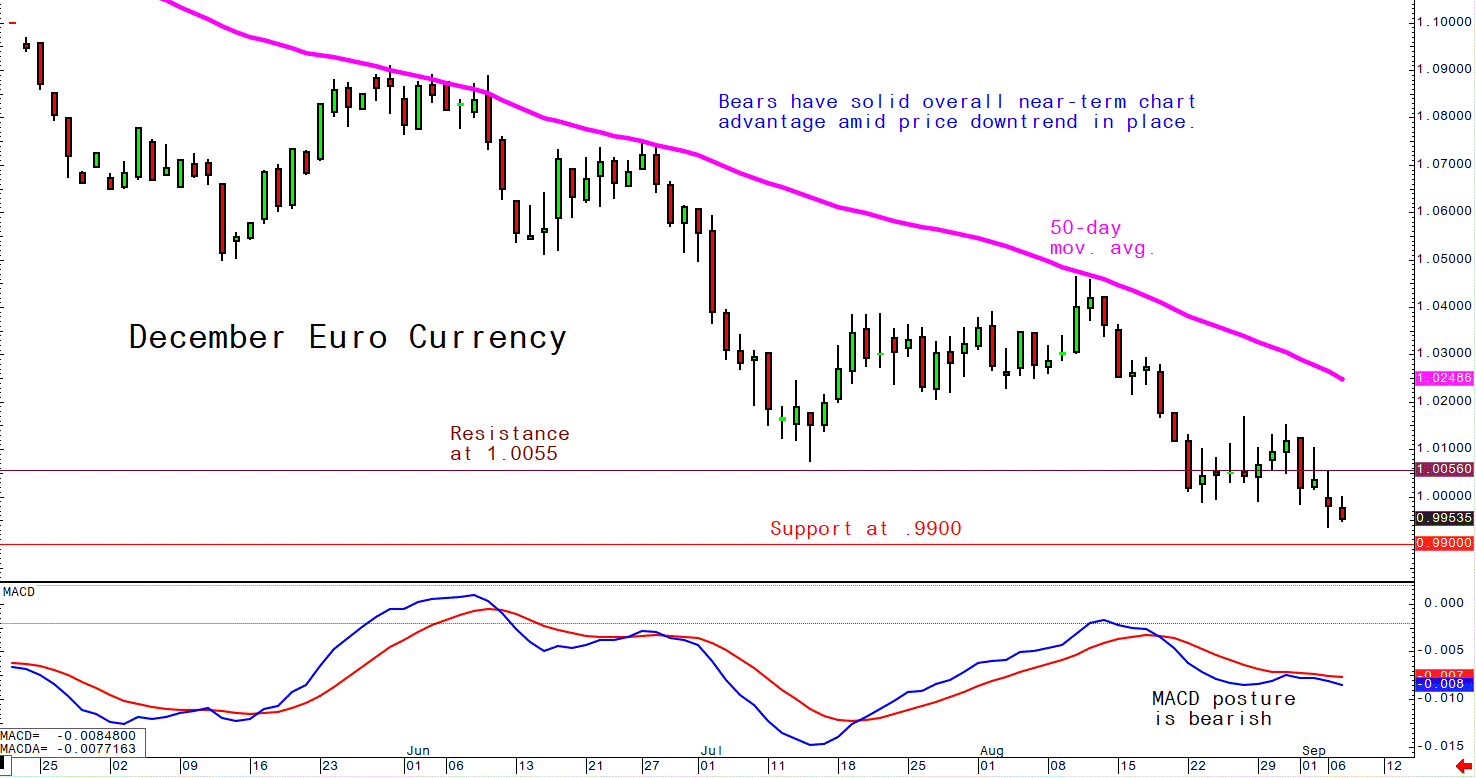
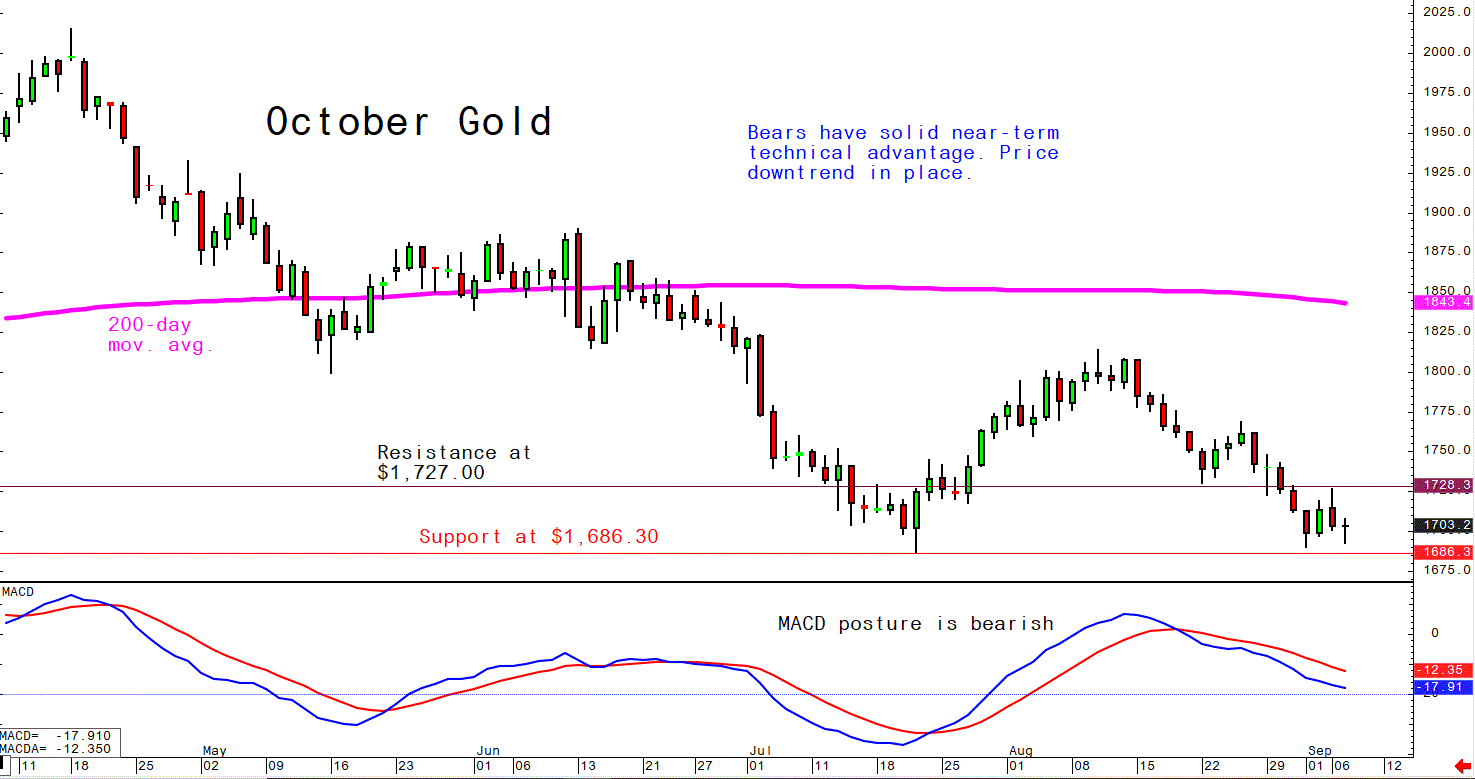
On tap today:
• U.S. trade deficit is expected to narrow to $70.2 billion in July from $79.61 billion one month earlier. (8:30 a.m. ET)
• Stats Canada to release Canadian grain/crop stocks figures as of July 31 at 8:30 am ET. UPDATE: Total wheat stocks fell by 38% y/y; Durum wheat fell to 0.57 million tons vs 0.81 million; Canola fell to 0.88 million tons vs 1.78 million in the same period last year.
• Bank of Canada is expected to lift its benchmark interest rate by three-quarters of a percentage point to 3.25%. (10 a.m. ET)
• Obamas back to White House: President Biden and First Lady Jill Biden will host former President Barack Obama and former First Lady Michelle Obama in the White House for a portrait unveiling ceremony. 1:30 p.m. ET.
• Federal Reserve's Beige Book is due out at 2 p.m. ET.
• Fed speakers: Richmond's Thomas Barkin on cybersecurity in the financial sector at 9 a.m. ET, Cleveland's Loretta Mester to Market News International at 10 a.m. ET, Vice Chair Lael Brainard on the economic outlook and monetary policy at 12:40 p.m. ET, and Vice Chair for Supervision Michael Barr on financial regulations at 2 p.m. ET.
U.S. is losing soybean-export edge as Brazil closes logistics gap. U.S. farmers confronting supply-chain bottlenecks and a surging dollar are losing their competitive edge in the global market for soybeans to their biggest rival: Brazil. In most of the years through 2020, it was about twice as expensive for China — the top importer — to ship Brazilian rather than American soybeans. But logistics issues in the U.S., upgrades of the South American country’s ports and supply infrastructure, and a strong dollar have almost eliminated that gap, USDA data show, Bloomberg reports (link). It now costs roughly the same for a Chinese buyer to transport a ton of soybeans from Brazil’s biggest-growing state of Mato Grosso as it does from No. 2 U.S. producer, Iowa. And the differential has closed despite a surge in fuel prices this year that’s stoked inflation.
Brazil is reaping the benefits of more than 290 billion reais ($56.1 billion) the federal government has invested in roads and maritime gateways since 2008.
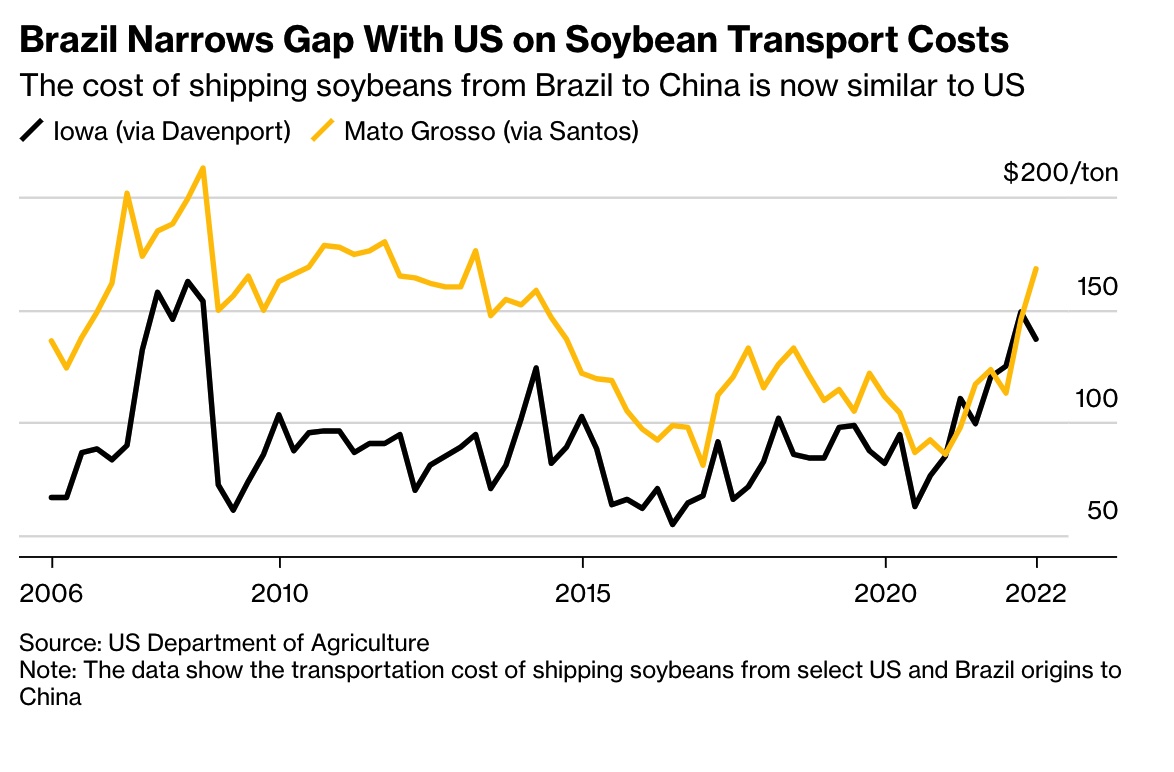
Bank of England predicts that inflation will hit 13% this quarter. GDP will also turn negative this quarter, it says — and will then stay negative through every quarter of 2023. After that, in 2024 and onward, growth is projected to be "very weak by historical standards." Household incomes are expected to fall by 1.5% this year, after accounting for taxes and inflation, and by another 2.25% next year.
Eurozone Q2 GDP a bit better than initially estimated. The revised Eurozone second quarter GDP rose 0.8% from the first quarter, slightly better than the initial estimate of up 0.6%. On an annualized basis, second quarter Eurozone GDP showed a growth rate of 4.1%.
Market perspectives:
• Outside markets: The U.S. dollar index is higher and touched another 20-year high in early U.S. trading. The yield on the 10-year U.S. Treasury note is fetching around 3.3%. U.S. crude was around $86.20 per barrel and Brent around $92.05 per barrel. Gold and silver futures were little changed, with gold around $1,713 per troy ounce and silver around $18.05 per troy ounce.
• Watermark. The S&P Global Water Index, which tracks 50 companies from around the world that are involved in water utilities, infrastructure, equipment and materials, has outperformed the S&P Global Broad Market Index by more than 3 percentage points per year since its beginning in late 2001. So far this year, the Global Water Index return has been nearly 5 percentage points higher than the S&P Global BMI. Recent reports from the World Economic Forum estimate the global water industry at $483 billion, as of mid-2022. Investors want in: There were 23 water funds launched over the last five years, with a collective $8 billion in assets, according to Morningstar data.
• Australia’s projected bumper wheat crop may be running into supply-chain constraints. The country is projecting its second-largest wheat harvest ever following above-average rainfall on its east coast. The Wall Street Journal reports (link) the yield could bring a windfall to farmers at a time of record-high wheat prices and help calm global markets concerned about food security. But much of the country’s storage capacity is already full, ports are operating at capacity and exporters face trouble finding capacity in a bulk shipping sector that has been knocked sideways over the past year. Russia’s invasion of Ukraine has disrupted grain-supply routes that were already strained by the pandemic. Australia has been exporting more than 75% of its grain due to outsize harvests over the past two years. But container shortages and potential shipping delays have left Australian wheat fetching less than the global average price, undercutting the potential financial gains.
• Ag trade: South Korea purchased 55,000 MT of feed wheat expected to be sourced from Australia. Japan tendered to buy 70,000 MT of feed wheat and 40,000 MT of feed barley.
• NWS weather: Dangerous heat continues throughout the West today before gradually relaxing by the end of the week... ...Extremely Critical Fire Weather forecast over parts of the northern High Plains... ...Heavy rain and gusty winds associated with Hurricane Kay to begin entering southern California and the Desert Southwest by Friday... ...Unsettled weather and flash flood chances to increase over the Southeast and eastern Gulf Coast by late week.
In California, Sacramento hit 116 degrees on Tuesday, the hottest day on record for the state capital, according to the National Weather Service (NWS). Records have also been surpassed in parts of Northern California, Utah and Montana —with some cities shattering previous daily highs by more than 10 degrees. As a result, some of the nation's largest utility companies are notifying their customers to prepare for potential rotating power outages.
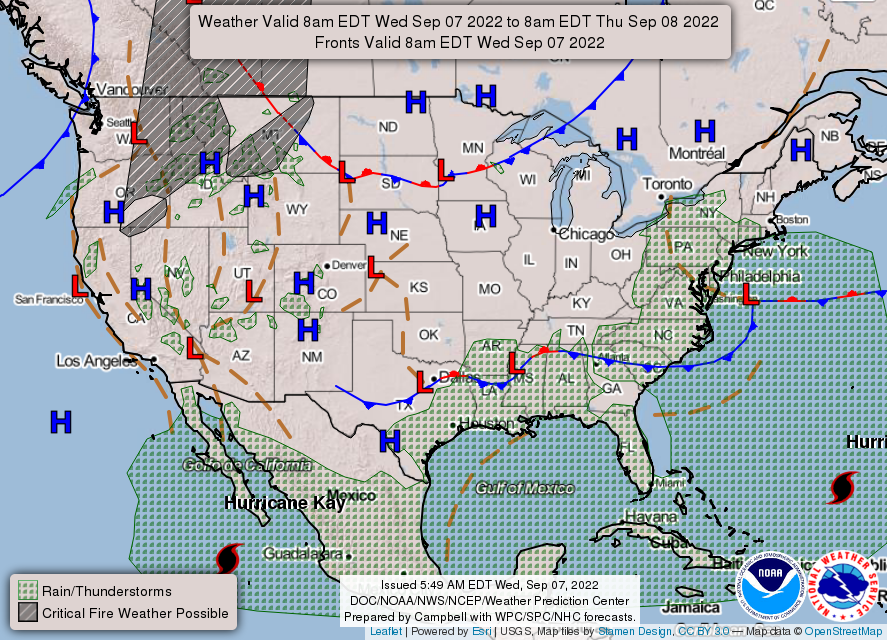
Items in Pro Farmer's First Thing Today include:
• Wheat prices post strong gains overnight
• Corn, soybean CCI ratings continue to deteriorate
• China’s August soybean imports remain sluggish (details in China section)
• Cash cattle uncertainty
• Lean hog futures bounce
|
RUSSIA/UKRAINE |
— Summary: Volodymyr Zelenskyy, Ukraine’s president, welcomed the U.N.’s calls for a safety zone around the Zaporizhia nuclear station. Europe’s biggest nuclear power plant, in Russian-held territory in southern Ukraine, has been the site of shelling for months (see related item below). Last week 14 U.N. inspectors visited the site; two have stayed on. Meanwhile, NATO Secretary General Jens Stoltenberg said the war in Ukraine is “entering a critical phase” and warned of a tough winter ahead for members of the military alliance that could include “energy cuts, disruptions and perhaps even civil unrest.” And, Russia wants to buy millions of rockets and artillery shells from North Korea to use in its war against Ukraine, a sign that Western sanctions on its military and economy are starting to bite, US officials said Tuesday.
- Russian President Vladimir Putin appeared to threaten a deal allowing Ukraine’s grain exports to resume via the Black Sea. Market impact: Wheat prices surged overnight. Details: Addressing the Eastern Economic Forum in Vladivostok, Putin claimed that “practically all” of Ukraine’s grain exports were being sent to the EU, rather than the poorest countries. “I met with the leaders of the African Union, with the leaders of African countries, and promised them that we would do everything to ensure their interests and facilitate the export of Ukrainian grain,” Putin was quoted as saying. “We are honoring the agreements. (but) it turns out… that they (the West) have just royally screwed us over and not just us but the poorest countries whose interest were the pretext of doing all this.” Putin said he now wants to renegotiate the deal, raising concerns the pact may not be able to last. Link to Reuters article for more.
Putin also said some restrictions on Russia’s fertilizer exports had been eased, but “clever sanctions” were still complicating Russian trade. “There are no direct sanctions against products, but there are restrictions related to logistics, freight, payments and insurance. Many of these elements of restrictions remain,” Putin said. - U.S. wants a $44 per barrel cap on Russian oil prices under the agreement reached by G7 countries last week, according to U.S. Deputy Secretary of the Treasury Adewale Adeyemo, referencing the level signaled by Russia as its cost of production in remarks he made to Bloomberg. “We’re not going to set that price below Russia’s price of production,” he said, indicating the level would still encourage Russian production but not allow them to gain benefits from market turmoil. “The goal will be of our policy to try and drive down their revenues while keeping, allowing them to continue to flow energy out of Russia,” Adeyemo said. Details of the plan are to be made by the G7 countries that agreed to the plan. The G7 price cap is entering into effect on Dec. 5 for crude oil and on Feb. 5, pending the finalization of the price caps "based on a range of technical inputs.”
Russia stated last week that it would not sell oil to countries with a price cap in place. Also, naysayers note the price cap coalition is simply not broad enough to make the cap work. The coalition, despite the G7’s best efforts, does not include either China or India — Russia’s two biggest oil clients. Meanwhile, Japan, would be hard pressed to enforce the price cap, given its dependence on any and all sorts of energy imports. It was not a surprise that while Japan’s finance minister Shinuchi Suzuki celebrated the G7 decision, oil from Sakhalin-2, the Russian project, which is exported to Japan, will be excluded from the price cap.
A price cap on Russian oil will work, the Yale professors Jeffrey Sonnenfeld and Steven Tian argue. Link for details. - ABC News notes President Biden’s opposition to labeling Russia sponsor of terrorism. On ABC’s Good Morning America, Robin Roberts said Ukrainian President Volodymyrr Zelensky is “calling on the U.S. to take a major step and classify Russia as a sponsor of terrorism.” David Muir, who interviewed Zelensky, went on to report from Kyiv that Zelensky told him “he is not interested in any compromise with Vladimir Putin. Saying to me, ‘you cannot have dialogue with terrorists.” But Muir added, “Overnight, President Biden returning to the White House was asked after our interview if he would support designating Russia as a state sponsor of terrorism. He simply said ‘no.’”
- IAEA urges Ukraine and Russia to halt fighting near nuclear plant. Reuters reports that the International Atomic Energy Agency (IAEA) called on Tuesday for fighting to be halted in a security zone around Europe’s biggest nuclear power station, saying its experts had found extensive damage at the plant on the front in the Ukraine war. According to Reuters, “A long-awaited report did not ascribe blame for damage to the Zaporizhzhia nuclear power plant, which Russia and Ukraine each accuse each other of shelling. But it called the situation unsustainable and said unless the shooting stops there would be a risk of disaster. ... While the ongoing shelling has not yet triggered a nuclear emergency, it continues to represent a constant threat to nuclear safety and security with potential impact on critical safety functions that may lead to radiological consequences with great safety significance,” the IAEA wrote.”
IAEA Director-General Rafael Grossi, who led the inspection visit, briefed the U.N. Security Council later Tuesday on his findings. The AP reported that “shelling continued around Europe’s largest nuclear plant on Tuesday, a day after it was again knocked off Ukraine’s electrical grid and put in the precarious position of relying on its own power to run its safety systems.” According to the AP, “Normally the plant relies on power from the outside to run the critical cooling systems that keep its reactors and its spent fuel from overheating. A loss of those cooling systems could lead to a meltdown or other release of radiation.” - White House adviser: U.S. will work with Europe to make up for lost Russian gas flows. In an appearance on CNBC’s Squawk Box, Amos Hochstein, White House coordinator for international energy affairs, said, “Russia has dropped all the pretexts – they used to give all kind of excuses that they had to shut down pipelines for maintenance, or for all kinds of imaginary disruptions. And we’ve always known that Russia lies about those issues; that what they really are is using energy as a weapon. And they ultimately have done that...and have removed all pretext. ... The reality though is the United States has been warning about this,” and “preparing for this. ... And we are working hand in hand between the United States and European leaders to identify what we can do to make sure that Europeans are secure through the winter. But, ultimately, this is going to hurt Russia: Russia’s revenues and Russia’s credibility as a supplier.”
|
POLICY UPDATE |
— Dutch ag minister resigns amid widespread pollution protests. Dutch agriculture minister Henk Staghouwer abruptly resigned after nine months, saying he was not the right person to lead an ambitious overhaul of the Dutch farming sector as it moves to comply with the EU’s Nitrate Directive and curb emissions from fertilizer and livestock. He will be temporarily replaced by former agriculture minister, Carola Schouten. Dutch leaders called for a 30% reduction in the country’s livestock earlier this year, a step it described as necessary in delivering on its climate goals. But in some areas, the government's cuts could reach as high as 70% — which Dutch farmers argue would force many to either massively scale back production or to shut down operations completely. The planned cuts sparked massive protests this summer, where crowds used tractors, trucks, and bales of hay to block canals, roads, and halt activity at key distribution centers. Though it is just slightly larger than the state of Maryland, the Netherlands is the world’s second-largest exporter of agricultural goods, behind only the U.S., and its exports in that sector totaled roughly 105 billion euros last year alone.
|
PERSONNEL |
— Biden nominates Leahy, Risch to represent Congress at 77ᵀʰ U.N. General Assembly. The White House today said that President Biden today announced his intent to nominate the congressional representatives and public delegates to the 77ᵗʰ U.N. General Assembly. According to the White House, Biden intends to nominate Sen. Patrick Leahy (D-Vt.) and Sen. Jim Risch (R-Id.) as congressional representatives of the United States; and S. Douglas Bunch, Carol Leslie Hamilton, and Andrew Weinstein, as public delegates of the United States.
Meanwhile, the Senate Finance Committee meets today to vote on the nomination of Douglas J. McKalip to be chief agricultural negotiator for the Office of the U.S. Trade Representative.
|
CHINA UPDATE |
— Chinese leader Xi Jinping and Russian President Vladimir Putin are set to meet next week, according to Russian state media. This would be the first face-to-face meeting between the two leaders who have established a close relationship since Russia invaded Ukraine Feb. 24. Experts say the meeting also signals the importance of the Russian relationship for China amid international blowback for Moscow's unprovoked military actions.
— China’s export growth slowed as global demand weakened and domestic Covid-19 lockdowns and heatwaves hit production. Exports increased by 7.1% year on year in August, to $314.9 billion, the weakest gain since April, versus 18% in July. Imports grew just 0.3%, leaving a trade surplus of $79.4 billion. Asian stock markets slumped in response. The MSCI index of Asia-Pacific shares fell to its lowest level in two years.
Of note: China’s exports to the U.S. shrank for the first time in more than two years while shipments to Russia surged as slowing economies and the war in Ukraine are shifting global trade flows along geopolitical fault lines. China’s exports to the U.S. fell 3.8% in August from a year earlier, the first contraction since May 2020. Exports to Russia surged 26.5% as Chinese brands filled a gap left by departing Western companies.
Bottom line: The larger-than-expected slowdown in export growth is raising fears that the engine of the world’s second-largest economy is sputtering, as fresh Covid lockdowns in major Chinese cities are further restraining spending and the world economy edges closer to recession. Meanwhile, shipping companies are trying to realign their capacity with an expected softening in consumer demand. Maersk, for instance, announced on Sept. 2 the cancelations of four China-to-North America sailings this month.
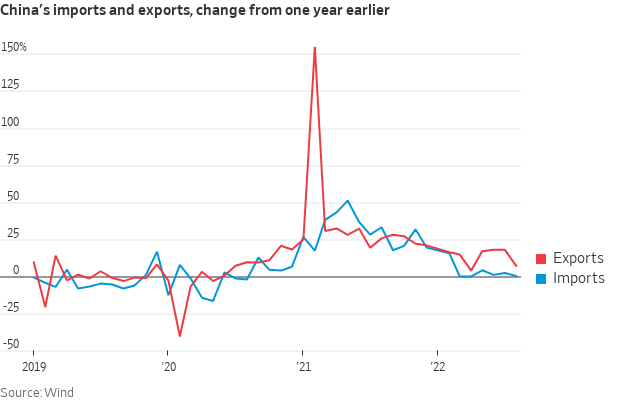
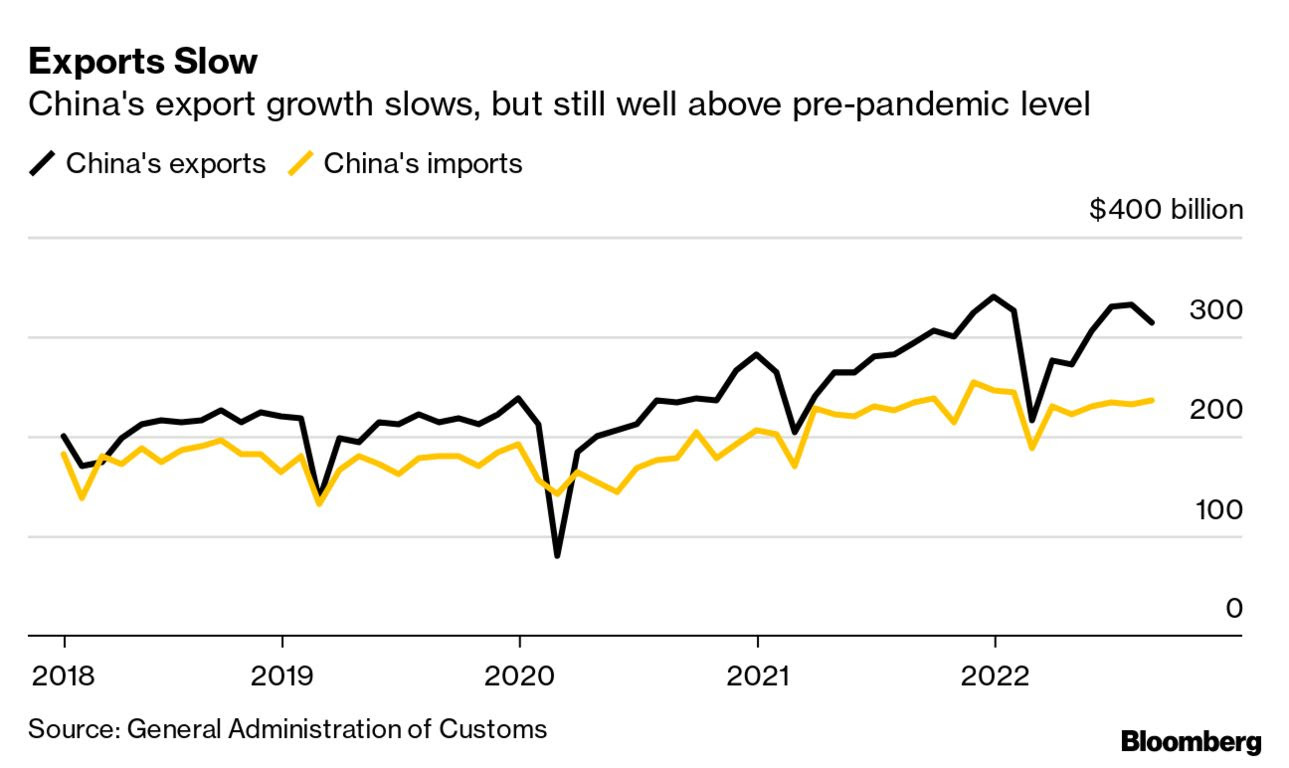
— China’s August soybean imports remain sluggish. China imported 7.17 MMT of soybeans in August, down 9.0% from July and 24.5% less than year-ago. That was the smallest August import tally since 2014. Soymeal demand has been weak and Chinese crush margins have been negative since mid-April, with crushers in the key processing hub of Rizhao losing 519 yuan ($74.80) for each metric ton of soybeans processed as of Sept. 5. Through the first eight months of this year, China imported 67.08 MMT of soybeans, down 8.6% from the same period last year.
— China meat imports up slightly from July but below year-ago. China imported 660,000 MT of meat during August, up 3.1% from July but 13.2% below last year’s tally. The preliminary data doesn’t break down meat imports by category, but the sharp year-over-year decline was due to fewer pork imports than August 2021. Through the first eight months of the year, China imported 6.69 MMT of meat, down 28.9% from the same period last year.
— China excluded from key CHIPS Act provision. The Biden administration announced that tech firms which receive federal funding under its new CHIPS Act will not be allowed to build any “advanced technology” facilities, or factories, in China for ten years. The move was justified on national security grounds, amidst fears of China stealing such technology. The U.S. also wants to rebuild its own share of the global semiconductor market, now just 10%, down from nearly 40% in 1990.
— China canceled a state-backed trade expo hosted by Ukraine to highlight the investment opportunities in Ukraine despite the Russian war. The South China Morning Post reported the cancellation and China offered no comment as to why the event was canceled.
|
LIVESTOCK, FOOD & BEVERAGE INDUSTRY |
— Meatpacking supply chains are improving but profits are shrinking. U.S. pork companies that struggled with production early in the pandemic now say they are paying more for hogs from farmers and are exporting less meat to China. The Wall Street Journal reports (link) that thinning margins at companies including Tyson Foods and Seaboard are one sign of the impact that higher prices are having as they course through supply chains. The rising costs are catching up with the roughly $43 billion U.S. pork industry. Consumer demand for pork is weakening, while rising costs for grain, fuel and other supplies are leading farmers to shrink their herds, making the hogs scarcer and more expensive. Tyson has already lowered its outlook for its pork business. CEO Donnie King says the company expects tight hog supplies and declining export demand to slice into sales volumes for the rest of the year.
— HPAI confirmed in Ohio commercial layer flock. USDA’s Animal and Plant Health Inspection Service (APHIS) confirmed highly pathogenic avian influenza (HPAI) in a commercial table egg layer flock of 3 million birds. The confirmation in the Defiance County, Ohio, flock is the 200th confirmed flock since February, bringing the total commercial flock birds targeted for depopulation to 40.0 million — 33.8 million were commercial egg layer birds. HPAI cases are a factor in surging egg prices seen this year in stores and why USDA is forecasting a large increase in those prices on a percentage basis.
|
CORONAVIRUS UPDATE |
— Summary:
- Global Covid-19 cases at 606,387,779 with 6,506,081 deaths.
- U.S. case count is at 94,897,687 with 1,048,217 deaths.
- Johns Hopkins University Coronavirus Resource Center says there have been 610,012,616 doses administered, 224,113,439 have been fully vaccinated, or 68.02% of the U.S. population.
— Biden administration announced Tuesday that the U.S. is moving toward annual shots against Covid-19. Vaccine experts say the shift to yearly shots signals that Covid-19 isn't going away. Dr. Ashish Jha, who is leading the White House Covid-19 Response Team, said newly authorized updated Covid-19 boosters will be free of charge to all who qualify and want them, but future vaccines and treatments may not be, as pandemic funding continues to dwindle. The Biden administration is seeking $22.4 billion in additional Covid funding from Congress after Republicans rejected earlier requests for new funding.
CDC Director Dr. Rochelle Walensky recently added that the seven-day average of Covid hospitalizations had dropped 14% to 4,500, and new vaccines could prevent as many as 100,000 hospitalizations and 9,000 deaths per year. She also forecasts that the shots could save billions in medical costs if people adopt them at the same level as annual flu vaccine coverage.
|
POLITICS & ELECTIONS |
— Voters in Massachusetts elected a former state lawmaker endorsed by ex-President Donald Trump as the Republican nominee for governor, CNN projects. The win by Geoff Diehl sets up a showdown with Democratic state Attorney General Maura Healey in the general election. Diehl will be the heavy underdog against Healey, whom CNN projected earlier Tuesday would win the Democratic nomination, setting her up to potentially become the state's first out lesbian governor.
— Stacey Abrams is trailing in polls of the Georgia governor’s race, worrying Democrats who hoped she would lead the state’s blue shift. Link to details via the NYT.
|
CONGRESS |
— Congress is headed for a showdown over Sen. Joe Manchin’s (D-W.Va.) plan to fast-track federal approvals of energy projects by attaching a permitting measure to must-pass stopgap funding legislation. The proposal is already drawing major opposition from environmental activists and progressive Democrats, and the outcome is murky.
— House Minority Leader Kevin McCarthy (R-Calif.) will give a speech in Pittsburgh on Sept. 19 outlining House Republican’s legislative plan if they win the majority in November, according to a spokesman. The speech, first reported by Axios, will provide a juxtaposition to Biden and Democrats by highlighting Republicans’ priorities and top issues.
|
OTHER ITEMS OF NOTE |
— Iran nuclear deal murky. Top U.S. officials have told Israel’s Prime Minister Yair Lapid that a nuclear deal between Iran and world powers won’t be signed in the foreseeable future, The Times of Israel reported.
— U.S. farmers again are pressing for immigration reform and are joining a push for national immigration reform that they say could ease labor shortages and lower food prices. Link for details.
|
KEY LINKS |
WASDE | Crop Production | USDA weekly reports | Crop Progress | Food prices | Farm income | Export Sales weekly | ERP dashboard | California phase-out of gas-powered vehicles | RFS | IRA: Biofuels | IRA: Ag | Student loan forgiveness | Russia/Ukraine war, lessons learned | Election predictions: Split Ticket |






